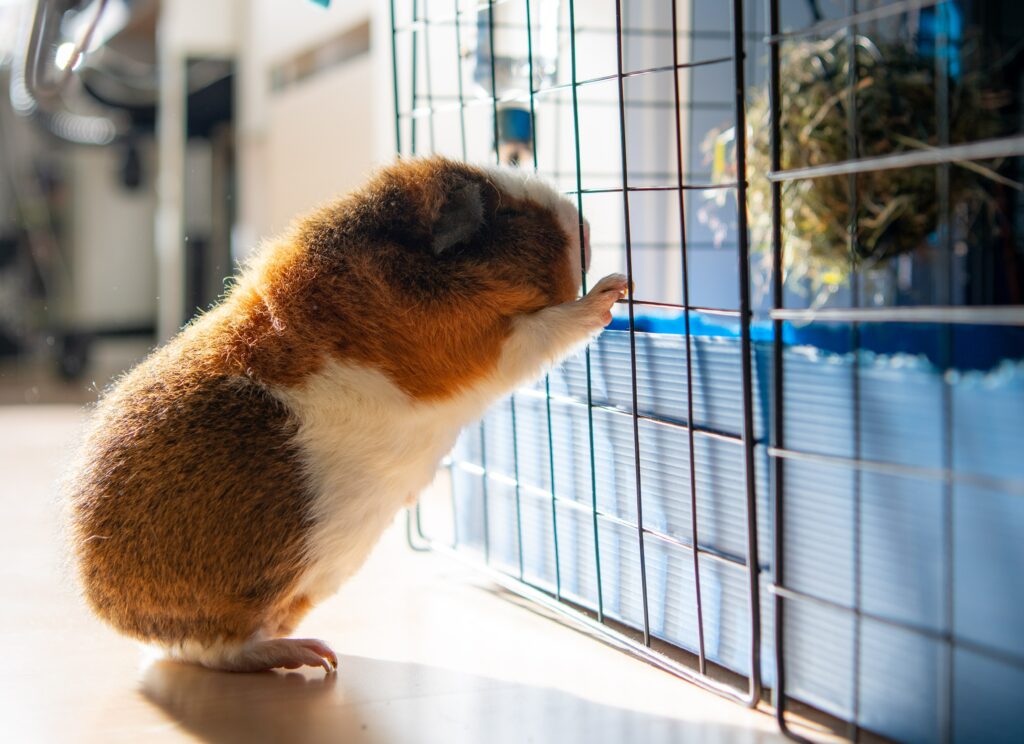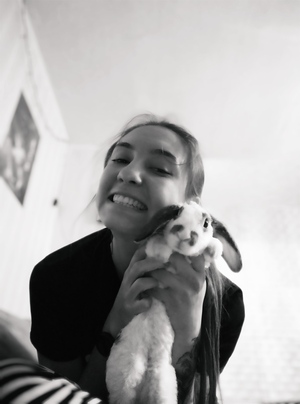When you first bring home a guinea pig, there are some essentials that every guinea pig owner should have. These items will not only make your guinea pig's life easier but also ensure their safety and happiness! In this blog post, we're going to discuss the top 10 Guinea Pig essentials so you can get started with your new pet right away. Check out our guinea pig starter kit below!

The number one essential for any guinea pig is a cage. The cage should be at least 24x36 inches, with a height of 12-16 inches. This will give your guinea pigs plenty of room to run around and play.
How to choose the proper size of the cage?
Here are the main things to look into the cages:
The second most important thing for guinea pigs is bedding. The bedding should be soft, absorbent, and safe for guinea pigs to eat. The best types of bedding are as follows:
Straw. It is a good choice for bedding because it's soft, absorbs well, and is safe to eat. However, it can be messy and difficult to clean.
Shredded paper or cardboard makes a good absorbent bedding but can also be messy.
Wood shavings (birch or aspen only) are the best bedding for guinea pigs because it's absorbent and safe to eat. But this type of wood is also dusty so you must wear a mask while changing the guinea pig cage or cleaning their houseю.
Carefresh is an excellent choice as well, but it can be quite expensive.
It's important to change the guinea pig bedding every day to prevent bacteria and mold growth.
A guinea pig hide house is the other most important thing you need to buy as a guinea pig owner. The guinea pigs like having their own houses because it gives them a place they can relax and feel safe. As with any other pet, your guinea pig's home should be his or her castle!
Make sure there are no sharp edges on the cage which could hurt your guinea pigs. The guinea pig house should be easy to clean and disinfect.
Your guinea pig will need fresh, clean water at all times. You can choose between glass or plastic water bottles for your guinea pigs' water container. The choice is yours! Just make sure it doesn't leak and always keep an extra on hand in case one gets dirty or broken. Having constant access to fresh water is extremely vital for guinea pig's health. Believe it or not, but a pet guinea pig drinks as much water as cats and dogs every day so having a drinking bottle full of water in the cage is a must-have.
Provide your guinea pig with a food dish made of ceramic, metal, or heavy plastic (preferably bpa free) so they don't tip it over when eating from it. Make sure you get rid of any leftover food after every meal because leftovers can attract insects and rodents into their cage which could be very dangerous for them. We encourage you to buy online a really heavy ceramic bowl so the guinea pig won`t flip it over.
The second essential for guinea pigs is a hay rack or feeder. Hay is an important part of their diet and should be available to them at all times. A hay feeder will keep the hay off the ground and prevent it from getting wet or soiled. It also makes it easier for the guinea pig to reach the hay.
There are many different types of hay feeders on the market, so choose one that best suits your needs. Some hay racks hang from the cage top, while others attach to the side of the cage. There are even some that attach to the guinea pig's water bottle.
One of the most important parts of the guinea pig's diet things you need to buy is hay. Guinea pigs are herbivores, so they must have unlimited hay sources of hay available at all times in their hay rack. Guinea pig's teeth continue growing throughout their entire lives and gnawing on this source of food is how they can naturally keep the length of their teeth in check.
There are several types of hay: orchard grass, oat, timothy hay and others found in pet stores but it's best not to feed them alfalfa hay due to its high protein content. Make sure that any type you choose is free from mould, dust and pesticides because these substances could be dangerous for your guinea pig if consumed.
Always offer your guinea pig a good-quality food pellet. Cheap pellets may not have all the nutrients guinea pigs need, so it's important to choose a quality brand. Pellets should be the only thing your guinea pig eats, except for occasional treats. Make sure to keep pellets in a dry place and away from direct sunlight, as pellets can quickly spoil if they get damp. Each day guinea pigs eat about a spoon of food pellets.
Vegetables are an important part of their diet and keep your guinea pig healthy. Vitamin C is essential for guinea pigs, so it's best to give them fresh vegetables every day. Make sure the fresh vegetables and leafy greens you offer your guinea pig aren't too starchy or salty. You can also try giving your guinea pig fruit but in limited amounts because they're high in sugar and could cause health problems for your guinea pig.
You should always remove any uneaten vegetables after 24 hours so they don't spoil inside the cage which is very important because mouldy vegetables could make your guinea pig sick.
Fresh fruit can be given as a treat, but they should only eat it in small quantities. An occasional slice of apple or banana is fine for them to nibble on, but too much fruit will rot their teeth and can cause obesity. This rule applies especially to grapes which are very sugary and dangerous for guinea pigs.
Trim your guinea pig's nails regularly. Nails should be checked by you every week or so because they can get too long and cause discomfort for the small animals, which could lead to infection. Some signs that their claws are getting too long include them moving slowly around the cage, sitting with one leg stretched out in front of them (to avoid having their feet on the floor), or leaning against things like walls to take some weight off their legs
If you don't want to cut your guinea pigs' claws yourself then it is best not to keep males as pets. Male guineas tend to have furrier feet while females usually do not. If male guinea pigs are being kept together they may fight over who has the more comfortable feet, and fight which can cause injury.
Trimming nails is also important if your pet lives in an outdoor hutch because long claws could become caught on wire mesh flooring or any other objects around the cage. This would result in torn nails, discomfort and irritation - not something you want to happen at all since this would mean a visit to the vet.
Nail clippers for guinea pigs are specially designed to avoid cutting the quick (the pink area where blood vessels and nerves run close to the surface of a nail or claw). Nail trimmer can be bought from most pet shops or online. Nail trimmer for guinea pigs is inexpensive, but it is best not to buy cheap ones because they could cause injury when used on them and you don't want that happening!
Long-haired guinea pigs will need brushing every week or two. This helps remove dead hair and keeps your guinea comfortable - if the fur gets matted, it can be very hot and uncomfortable for them. A soft-bristled brush is ideal for gently removing any lose or long hair, and should be done regularly to keep their coat looking healthy and shiny. If you want to avoid all this stuff, consider buying hairless guinea pigs.
Chew toys are important for guinea pigs because they help keep their teeth healthy. Guinea pigs have a natural instinct to chew, and if they don't chew regularly then their teeth can grow too long. This is called overgrown teeth and it's very common in guinea pigs.
In addition, to chew toys, make sure there are plenty of branches and twigs from safe trees in your guinea pig's cage. These provide an important source of fibre which will help keep their digestive system healthy.
You can also give them chew sticks as a treat every now and then if they don't have any teeth problems or other dietary requirements that stop this from being appropriate for them. Chew sticks come in different shapes, sizes and flavors so you should always check the packaging before giving it to your pet because not all chew stick treats are suitable for guinea pigs!
Make sure no wood is covered with paint or varnish - untreated wood is best since treated woods may contain chemicals that could be bad for your pets' health.
Guinea pigs are an excellent choice of a small pet, and we advise you to follow our guide to make your new furry friend happy. They're low-maintenance pets that thrive on attention, food, companionship (just like humans do), and safety. To help get started with your new companion's care, we have prepared a list of everything you need for the perfect guinea pig habitat! We know all about how much fun it can be to have a small animal running around at home these days because we've been there too - so don't hesitate to follow our blog if you want more information about guinea pig care or advice on caring for your new family member.

Hi! My name is Olga and I'm a bit of an animal lover. I've had several small pet animals through the years and I've learned a lot about them - from caring for them, to understand their behavior.
I'm a fan of rabbits, hamsters, and guinea pigs in particular, but I also love visiting rescue centers to learn more about other furry friends. It's amazing how much personality these little creatures can have - they're certainly not just "cute" animals!